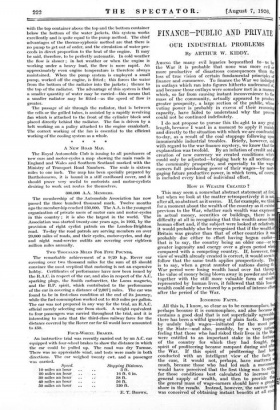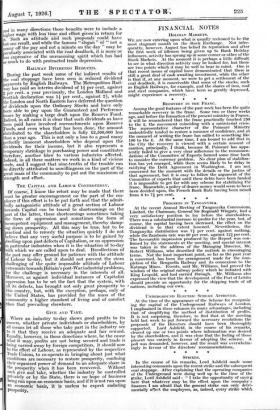FINANCE - PUBLIC AND PRIVATE
OUR INDUSTRIAL PROBLEMS
By ARTHUR W. KIDDY.
AMONG the many evil legacies bequeathed to us by the War it is probable that none was more evil or more productive of disastrous consequences than the loss of true vision of certain fundamental principles of finance and commerce. To finance the War we indulged in outlays which ran into figures hitherto undreamed of, and because those outlays were somehow met in a manna which, so far from causing instant inconvenience to the mass of the community, actually appeared to produce greater prosperity, a large section of the public, whose voting power is probably in excess of their reasoning capacity, have failed to understand why the process could not be continued indefinitely. .
I do not propose to pursue this the ught to any great length, because I want in a moment to apply it mainly and directly to the situation with which we are confronted to-day, as a result of the coal stoppage following upon innumerable industrial troubles. Briefly, however, and with regard to the war finance mystery, we know that the explanation was twofold. By an inflation of credit and creation of new currency we created conditions which could only be adjusted—bringing back to all sections of the community prosperity, and especially to the wage- earners full purchasing power of their wages—by mod gaging future productive power, in which term, of course, is included every kind of individual effort.
How IS WEALTH CREATED 4?
This may seem a somewhat abstract statement at fi but when we look at the matter retrospectively it is no after all, so abstract as it seems. If, for example, we t for a moment about the wealth of the country as it exist previous to the War, whether such wealth was exp in actual money, securities or buildings, there is difficulty at all in recognizing that this wealth arose f human effort and, if the subject were looked- at relatively, it would probably also be recognized that if the-wealth Britain was greater than that of other countries it probably due either to effort having begun earlier that is to say, the country being an older one—or greater ingenuity and energy over a given period wh compared with a competing country. If, however, t view of wealth already created is correct, it would seem follow that the same truth applies prospectively. The- is to say, when a great number of nations during th War period were losing wealth hand over fist throup the value of money being blown away in powder and shot together with the still more valuable form of wait' represented by human lives, it followed that this loss o wealth could only be restored by a period of intense effo after the period of the War.
IGNORING FACTS.
All this is, I know, so cl ear as to be commonplace, b perhaps because it is commonplace, and also because contains a good deal that is not superficially agreeabl there has been a wilful ignoring of plain facts. Inspi by unduly high wages—initiated for the most pa by the State—and also, possibly, by a very natu feeling that those who had risked their lives in the W were entitled to an important stake in the fortun of the country for which they had fought, th spirit of profiteering became rampant during and one the War. If this spirit of profiteering had bee conducted with an intelligent view of the facts the case, it would not, perhaps, have mattered much, because those who had led such a movemen would have perceived that the first thing was to stri% for those conditions best calculated to increase th general supply of wealth, and then to provide the general mass of wage-earners should have a grea.t` share in the results. Instead, however, the narrow Nit was conceived of obtaining instant benefits at all co'. and in many directions- those -benefits-were to include a higher wage with less'time and effort given-in return for t. Such an attittide and such -proposals could have ut one result, and while the famous " slogan " Of- " not a penny off the pay and not a minute on the day " may be uliarly associated with the coal deadlock, it is more ess expressive of the unreasoning spirit which ha-s had o much to do with protracted trade depression.
RAILWAY DIVIDENDS REDUCED.
During the past week some of the indirect results of he coal stoppage have been seen in reduced dividend ayments by English Railways. The Metropolitan Rail- ay has paid an interim dividend of 1 per cent. against per cent. a year previously, the London Midland and cottish- declaration was 1i per cent., against 21, while he London and North Eastern have deferred the question f dividends upon the Ordinary Stocks and have only een able to pay upon the Guaranteed and Preference ssues by making a large draft upon the Reserve Fund. ndeed, in all cases it is clear that such dividends as have een paid have involved encroachments upon Reserve unds, and even when that has been done, the amount istributed to the shareholders is fully £2,500,000 less ban a year ago. This is not only a loss to a good many erfectly innocent shareholders who depend upon the ividends for their income, but it also represents a emporary shrinkage in purchasing power and constitutes herefore, another blow to various industries affected. ndeed, in all these matters we work in a kind of vicious ircle, and 'I suggest that nine-tenths of the trouble can e directly attributed to unwillingness on the part of the rent mass of the community to put out the maximum of trength and effort.
THE CAPITAL AND LABOUR CONTROVERSY.
Of course, I know the retort may be made that there must be greater encouragement on' the part of the em- Toyer if this effort is to be put forth and that the admit- edly antagonistic attitude of a great section of Labour towards Capital can be traced to shortcomings on the part of the latter, these shortcomings sometimes taking the form of oppression and sometimes the form of incompetent equipment and management, thereby damp- ing down prosperity. All this: may be true, but to be practical and to remedy the situation quickly I do not believe that any very useful purpose is to be gained by welling upon past defects of Capitalism, or on oppression n particular industries when it is the situation of to-day ith which we are called upon to deal. Recollections of he past may offer ground for patience with the attitude of Labour to-day, but it should not prevent the stern challenging of the quite impossible attitude of Labour extremists towards_ Britain's post-War industrial problems, for the challenge is necessary in the interests of all. Moreover, as against individual instances of Capitalist oppression has to be set the fact that the system, with all its defects, has brought not only great prosperity to this country, but, with the exception, perhaps, only of the United States, has provided for the mass of the community a higher standard of living and of comfort than that prevailing elsewhere.
GIVE AND TAKE.
Where an industry to-day shows good profits to its owners, whether private individuals or shareholders, by all means let all those who take part in the industry see to it that they receive an adequate and fair reward. Equally, however, in those directions where, be the cause what it may, profits are not being secured and trade is being carried away by foreign competitors, it should now be the effort of Labour, as represented by the respective Trade Unions, to co-operate in bringing about just what conditions are necessary to restore prosperity, confining their organized power of demand to an adequate share in the prosperity when it has been recovered. Without such give and take, whether the. industry he controlled privately or by the State, there is no hope of business being run upon an economic-basis, and if it is-not run upon an economic basis, it is useless to expect enduring Prosperity,







































 Previous page
Previous page